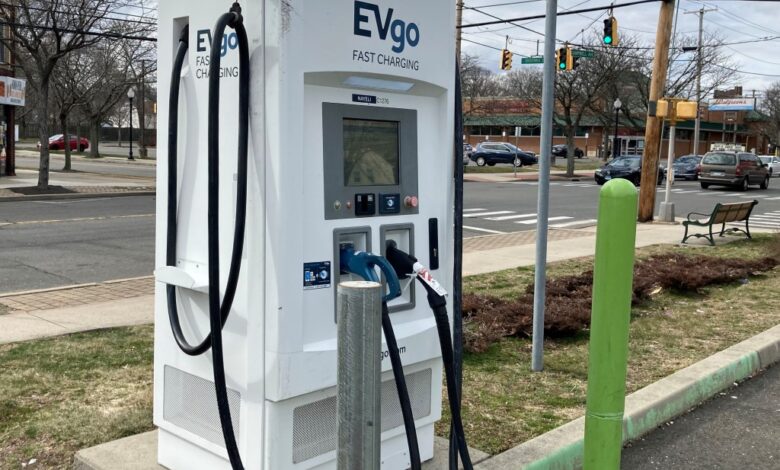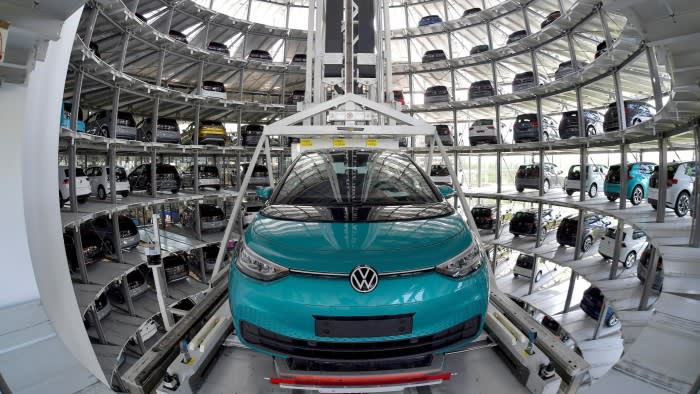New hope for EV chargers after tense CT meeting

A stand off over earnings between regulators and utilities that has delayed the state’s electric vehicle charging program could ease slightly after what one participant described as an angry meeting arranged Friday by Gov. Ned Lamont of stakeholders in the program.
After the 90 minute session, Eversource said it is lifting a “pause” it placed on the program, under which the electric utilities are required to subsidize a transition to electric vehicles by providing rebates to customers who install charging equipment.
Many Americans are still shying away from EVs despite Biden’s push, an AP-NORC/EPIC poll finds
“Eversource is ending the pause on processing applications for electric vehicle rebates for Connecticut customers,” a spokesman said. “Today’s discussion was an important conversation for all parties. We look forward to additional good-faith dialogue with state stakeholders to work toward the secure and long-term administration of this program.”
By early Friday night, United Illuminating, which also put the EV program on hold, had not decided the direction it would take “moving forward,” according to a person familiar with the company’s thinking.
The disagreement that has stalled the EV program and threatens similar initiatives is between the electric utilities and Marissa Gillett, Lamont’s appointee to chair the Public Utility Regulatory Authority, which decides how much the utilities can earn on the hundreds of millions of dollars they invest in clean energy projects and other sorts of grid improvements.
How Amazon became the largest private EV charging operator in the US
Gillett and members of her staff attended the meeting, which was run by a Lamont aide and attended by representatives of both utilities and the state Department of Energy and Environmental Protection.
Gillett and the utilities each claims the other misunderstands and misapplies the utility law that determines how much the utilities can profit on what they invest in clean energy and other grid improvement projects.
The utilities complain that regulators under Gillett have slashed earnings to such a degree that their stock and credit ratings have fallen, making it difficult or more costly to raise the money they invest in EV and other programs from investors and lenders. As a result, both utilities have said they are limiting spending in Connecticut to projects directly related to the reliable delivery of electricity.
In March, S&P Global Ratings downgraded United Illuminating from stable to negative in “view of an increasingly challenging regulatory environment in Connecticut.” Two weeks ago, Moody’s Analytics lowered the credit rating of Eversource subsidiary Aquarion Water because of “a Connecticut regulatory environment that is less consistent and predictable as evidenced by the PURA’s decisions involving the state’s regulated utilities over the last few years…”
The EV program was the first casualty of the cutbacks.
In May, the companies told regulators that they could resume the EV program if PURA allowed them to apply to recover costs through an annual rate adjustment process beginning in September and provided them with “a clear statement as to the standard that PURA will apply in reviewing and ruling on the recovery of deferred EV Program costs.”
The two sides failed to agree. Among other things, PURA told the companies they would have to wait another year for an opportunity to “seek” recovery. It also threatened to fine the utilities $10,000 for every day they continued to pause the EV program.
The result of Friday’s meeting was to back up the process a month or two and start over, according to officials with knowledge of the proceeding. In coming days, the utilities will file another regulatory request for a September rate adjustment hearing and a precise explanation of the standard by which the request will be judged.
The future of the EV program depends on PURA’s response, the officials said.



